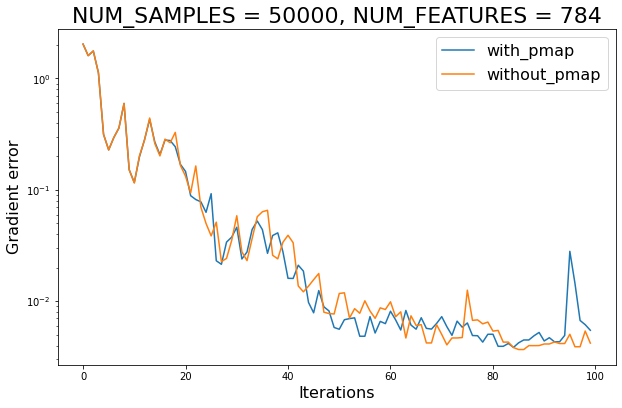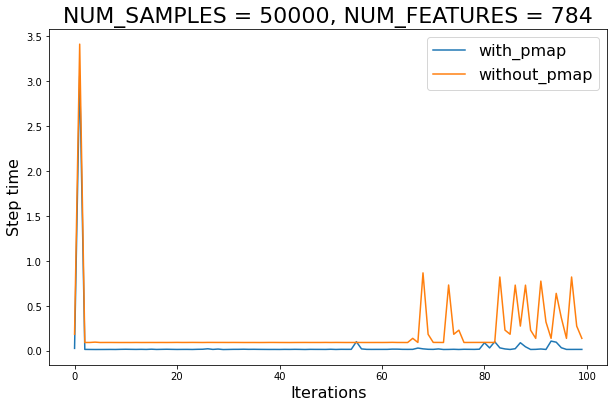# Copyright 2022 Google LLC.
#
# Licensed under the Apache License, Version 2.0 (the "License");
# you may not use this file except in compliance with the License.
# You may obtain a copy of the License at
#
# https://www.apache.org/licenses/LICENSE-2.0
#
# Unless required by applicable law or agreed to in writing, software
# distributed under the License is distributed on an "AS IS" BASIS,
# WITHOUT WARRANTIES OR CONDITIONS OF ANY KIND, either express or implied.
# See the License for the specific language governing permissions and
# limitations under the License.
jax.pmap example using JAXopt.
The purpose of this example is to illustrate how JAXopt solvers can be easily
used for distributed training thanks to jax.pmap. In this case, we begin by
implementing data parallel training of a multi-class logistic regression model
on synthetic data. General aspects to pay attention to include:
How to use
jax.laxreduction operators such asjax.lax.pmeanorjax.lax.psumin JAXopt solvers by using customvalue_and_gradfunctions.How
jax.pmapcan be used to transform the solver’supdatemethod to easily write custom data-parallel training loops.
To obtain the best performance on Google Colab we recommend:
In
Change runtime typeunder the menuRuntime, selectTPUfor theHardware acceleratoroption.Connect to the runtime and run all cells.
NOTE: this example can be easily adapted to support TPU pod slices (e.g. --accelerator_type v3-32) as well as hosts with one or more GPUs attached.
#@markdown The number of optimization steps to perform:
MAXITER = 100 #@param{type:"integer"}
#@markdown The number of samples in the (synthetic) dataset:
NUM_SAMPLES = 50000 #@param{type:"integer"}
#@markdown The number of features in the (synthetic) dataset:
NUM_FEATURES = 784 #@param{type:"integer"}
#@markdown The number of classes in the (synthetic) dataset:
NUM_CLASSES = 10 #@param{type:"integer"}
#@markdown The stepsize for the optimizer (set to 0.0 to use line search):
STEPSIZE = 0.0 #@param{type:"number"}
#@markdown The line search approach (either `'zoom'` or `backtracking`), ignored if `STEPSIZE > 0.0`:
LINESEARCH = 'zoom' #@param{type:"string"}
Imports and TPU setup
%%capture
%pip install jaxopt flax
import functools
import time
from typing import Any, Callable, Tuple, Union
from absl import app
from absl import flags
# activate TPUs if available
try:
import jax.tools.colab_tpu
jax.tools.colab_tpu.setup_tpu()
except KeyError:
print("TPU not found, continuing without it.")
from flax import jax_utils
from flax.training import common_utils
import jax
import jax.numpy as jnp
import jax.tools.colab_tpu
import jaxopt
import matplotlib.pyplot as plt
import numpy as np
from sklearn import datasets
jax.tools.colab_tpu.setup_tpu()
jax.local_devices()
[TpuDevice(id=0, process_index=0, coords=(0,0,0), core_on_chip=0),
TpuDevice(id=1, process_index=0, coords=(0,0,0), core_on_chip=1),
TpuDevice(id=2, process_index=0, coords=(1,0,0), core_on_chip=0),
TpuDevice(id=3, process_index=0, coords=(1,0,0), core_on_chip=1),
TpuDevice(id=4, process_index=0, coords=(0,1,0), core_on_chip=0),
TpuDevice(id=5, process_index=0, coords=(0,1,0), core_on_chip=1),
TpuDevice(id=6, process_index=0, coords=(1,1,0), core_on_chip=0),
TpuDevice(id=7, process_index=0, coords=(1,1,0), core_on_chip=1)]
Type aliases
Array = Union[np.ndarray, jax.Array]
Auxiliary functions
A minimal working example of how all-reduce mean/sum OPs can be introduced into JAXopt solver’s update method by overriding jax.value_and_grad. Note that more complex wrappers are of course possible.
def pmean(fun: Callable[..., Any], axis_name: str = 'b') -> Callable[..., Any]:
"""Applies `jax.lax.pmean` across `axis_name` for all of `fun`'s outputs."""
maybe_pmean = lambda t: jax.lax.pmean(t, axis_name) if t is not None else t
@functools.wraps(fun)
def wrapper(*args, **kwargs):
return jax.tree_map(maybe_pmean, fun(*args, **kwargs))
return wrapper
A small utility to shard Arrays across the available devices:
def shard_array(array: Array) -> jax.Array:
"""Shards `array` along its leading dimension."""
return jax.device_put_sharded(
shards=list(common_utils.shard(array)),
devices=jax.devices())
Custom-loop
The following code uses data-parallelism in the train loop. Through the use_pmap keyword argument we can deactivate this parallelism. We’ll use this feature later to benchmark the impact of parallelism.
def fit(
data: Tuple[Array, Array],
init_params: Array,
stepsize: float = 0.0,
linesearch: str = 'zoom',
use_pmap: bool = False,
) -> Tuple[np.ndarray, np.ndarray, float]:
"""Fits a multi-class logistic regression model for demonstration purposes.
Args:
data: A tuple `(X, y)` with the training covariates and categorical labels,
respectively.
init_params: The initial value of the model's weights.
stepsize: The stepsize to use for the solver. If set to `0`, linesearch will
be used instead.
linesearch: The linesearch algorithm to use. If `stepsize > 0`, linsearch
will be disabled.
use_pmap: Whether to distribute the computation across replicas or use only
the first device available.
Returns:
The per-step errors and runtimes, as well as the JIT-compile time for the
solver's `update` function.
"""
# Value and grad of the objective function for the solver.
value_and_grad_fun = jax.value_and_grad(jaxopt.objective.multiclass_logreg)
# When `jax.pmap`ing the computation, use JAXopt's option to provide a custom
# `value_and_grad` function to include the desired reduction operators. For
# example, here we decide to average across replicas.
if use_pmap:
value_and_grad_fun = pmean(value_and_grad_fun)
# To override `jax.value_and_grad` in a JAXopt solver, set the flag
# `value_and_grad` to `True` and pass the custom implementation of the
# `value_and_grad` function as `fun`.
solver = jaxopt.LBFGS(fun=value_and_grad_fun,
value_and_grad=True,
stepsize=stepsize,
linesearch=linesearch)
# Apply the `jax.pmap` transform to the function to be computed in a
# distributed manner (the solver's `update` method in this case). Otherwise,
# we JIT compile it.
if use_pmap:
update = jax.pmap(solver.update, axis_name='b')
else:
update = jax.jit(solver.update)
# Initialize solver state.
state = solver.init_state(init_params, data=data)
params = init_params
# If using `pmap` for data-parallel training, model parameters are typically
# replicated across devices.
if use_pmap:
params, state = jax_utils.replicate((params, state))
# Finally, since in this demo we are *not* using mini-batches, it pays off to
# transfer data to the device beforehand. Otherwise, host-to-device transfers
# occur in each update. This is true regardless of whether we use distributed
# or single-device computation.
if use_pmap: # Shards data and moves it to device,
data = jax.tree_map(shard_array, data)
else: # Just move data to device.
data = jax.tree_map(jax.device_put, data)
# Pre-compiles update, preventing it from affecting step times.
tic = time.time()
_ = update(params, state, data)
compile_time = time.time() - tic
outer_tic = time.time()
step_times = np.zeros(MAXITER)
errors = np.zeros(MAXITER)
for it in range(MAXITER):
tic = time.time()
params, state = update(params, state, data)
jax.tree_map(lambda t: t.block_until_ready(), (params, state))
step_times[it] = time.time() - tic
errors[it] = (jax_utils.unreplicate(state.error).item()
if use_pmap else state.error.item())
print(
f'Total time elapsed with {linesearch} linesearch and pmap = {use_pmap}:',
round(time.time() - outer_tic, 2), 'seconds.')
return errors, step_times, compile_time
Boilerplate
Creates dataset, calls fit with and without jax.pmap, makes figures.
def run():
"""Boilerplate to run the demo experiment."""
data = datasets.make_classification(n_samples=NUM_SAMPLES,
n_features=NUM_FEATURES,
n_classes=NUM_CLASSES,
n_informative=50,
random_state=0)
init_params = jnp.zeros([NUM_FEATURES, NUM_CLASSES])
errors, step_times, compile_time = {}, {}, {}
for use_pmap in (True, False):
exp_name: str = f"{'with' if use_pmap else 'without'}_pmap"
_errors, _step_times, _compile_time = fit(data=data,
init_params=init_params,
stepsize=STEPSIZE,
linesearch=LINESEARCH,
use_pmap=use_pmap)
errors[exp_name] = _errors
step_times[exp_name] = _step_times
compile_time[exp_name] = _compile_time
plt.figure(figsize=(10, 6.18))
for use_pmap in (True, False):
exp_name: str = f"{'with' if use_pmap else 'without'}_pmap"
plt.plot(jnp.arange(MAXITER), errors[exp_name], label=exp_name)
plt.xlabel('Iterations', fontsize=16)
plt.ylabel('Gradient error', fontsize=16)
plt.yscale('log')
plt.legend(loc='best', fontsize=16)
plt.title(f'NUM_SAMPLES = {NUM_SAMPLES}, NUM_FEATURES = {NUM_FEATURES}',
fontsize=22)
plt.figure(figsize=(10, 6.18))
for use_pmap in (True, False):
exp_name: str = f"{'with' if use_pmap else 'without'}_pmap"
plt.plot(jnp.arange(MAXITER), step_times[exp_name], label=exp_name)
plt.xlabel('Iterations', fontsize=16)
plt.ylabel('Step time', fontsize=16)
plt.legend(loc='best', fontsize=16)
plt.title(f'NUM_SAMPLES = {NUM_SAMPLES}, NUM_FEATURES = {NUM_FEATURES}',
fontsize=22)
return errors, step_times, compile_time
Main
print("num_samples:", NUM_SAMPLES)
print("num_features:", NUM_FEATURES)
print("num_features:", NUM_CLASSES)
print("maxiter:", MAXITER)
print("stepsize:", STEPSIZE)
print("linesearch (ignored if `stepsize` > 0):", LINESEARCH)
print()
errors, step_times, compile_time = run()
print('Average speed-up (ignoring compile):',
round((step_times['without_pmap'] / step_times['with_pmap']).mean(), 2))
num_samples: 50000
num_features: 784
num_features: 10
maxiter: 100
stepsize: 0.0
linesearch (ignored if `stepsize` > 0): zoom
Total time elapsed with zoom linesearch and pmap = True: 5.88 seconds.
Total time elapsed with zoom linesearch and pmap = False: 20.39 seconds.
Average speed-up (ignoring compile): 7.08

